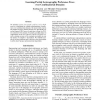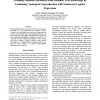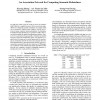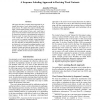AAAI
2015
8 years 1 months ago
2015
Existing approaches to active learning are generally optimistic about their certainty with respect to data shift between labeled and unlabeled data. They assume that unknown datap...
AAAI
2015
8 years 1 months ago
2015
We introduce partial lexicographic preference trees (PLPtrees) as a formalism for compact representations of preferences over combinatorial domains. Our main results concern the p...
AAAI
2015
8 years 1 months ago
2015
Flexibility in agent scheduling increases the resilience of temporal plans in the face of new constraints. However, current metrics of flexibility ignore domain knowledge about h...
AAAI
2015
8 years 1 months ago
2015
Fast and efficient learning over large bodies of commonsense knowledge is a key requirement for cognitive systems. Semantic web knowledge bases provide an important new resource o...
AAAI
2015
8 years 1 months ago
2015
Users commonly use Web 2.0 platforms to post their opinions and their predictions about future events (e.g., the movement of a stock). Therefore, opinion mining can be used as a t...
AAAI
2015
8 years 1 months ago
2015
Algorithmic reductions are one of the corner stones of theoretical computer science. Surprisingly, to-date, they have only played a limited role in machine learning. In this paper...
AAAI
2015
8 years 1 months ago
2015
Sequential decision problems that involve multiple objectives are prevalent. Consider for example a driver of a semiautonomous car who may want to optimize competing objectives su...
AAAI
2015
8 years 1 months ago
2015
To judge how much a pair of words (or texts) are semantically related is a cognitive process. However, previous algorithms for computing semantic relatedness are largely based on ...
AAAI
2015
8 years 1 months ago
2015
This paper describes a learning-based approach for automatic derivation of word variant forms by the suffixation process. We employ the sequence labeling technique, which entails...
AAAI
2015
8 years 1 months ago
2015
The abundance of algorithms developed to solve different problems has given rise to an important research question: How do we choose the best algorithm for a given problem? Known ...




